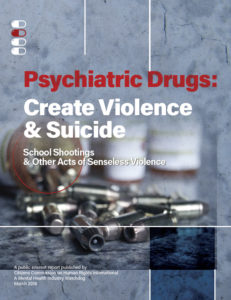CCHR calls for disclosure of mass killers’ history of psychiatric drugs, many of which are likely among the 31 prescription drugs most associated with violence.
Ten years ago today, James Holmes entered a movie theater in Aurora, Colorado, and opened fire, killing 12 people and injuring 70 others. In a notebook where he recorded his thoughts leading up to the mass murder, he wrote about the dehumanizing effects the psychiatric drugs he was prescribed were having on his mental state.
His words are highly relevant to the current wave of mass shootings in the U.S. and add urgency to the call by Citizens Commission on Human Rights (CCHR) for mandatory toxicology testing of the perpetrators of these acts of violence to determine what psychiatric or other drugs are involved.
Holmes, a university graduate student, had gone to a campus mental health center for help with his anxiety in social situations. He wrote that at his first appointment, the psychiatrist “immediately prescribed antidepressants.” In addition to an SSRI (selective serotonin reuptake inhibitor) antidepressant, he was also prescribed a benzodiazepine drug. His notebook entry went on to report that the drugs were ineffective: “No effect when needed.”

This entry is followed by a chilling series of statements: “First appearance of mania occurs, not good mania. Anxiety and fear disappears. No more fear…. No fear of consequences…. No more fear, hatred unchecked.”
The psychiatrist subsequently replaced the benzodiazepine with an antipsychotic drug. Holmes met with a psychiatrist five times in the months before he dropped out of college. He went on his deadly rampage a few weeks later. His psychiatrist later testified at the murder trial that Holmes had told her his homicidal thoughts “were the worst they had been.”
All three of the psychiatric drugs Holmes was prescribed are on the list of the 31 prescription drugs most associated with violent thoughts and actions, according to a 2010 study published in the peer-reviewed, open access scientific journal PLOS ONE. The 31 drugs – 25 of them psychiatric drugs – accounted for 79% of all reports of violence the FDA received through its adverse event reporting system in the five years prior to the study.
Of nearly 410 warnings about psychotropic drugs issued by international drug regulatory agencies, 27 warn of violence, aggression, hostility, mania, psychosis or homicidal thoughts.
“Antidepressants double the risk of suicidality and violence.”
– Researcher Andreas Bielefeldt, Nordic Cochrane Centre
A great many mass killings, murders, and other senseless acts of violence over the past three decades have been linked to the psychiatric drugs prescribed to the perpetrators as mental health treatment – most especially the newer generation, SSRI and SNRI (serotonin-norepinephrine reuptake inhibitor) antidepressants. CCHR issued its report, “Psychiatric Drugs Create Violence and Suicide,” in 2018, detailing 60 cases of high-profile violence committed by perpetrators of all ages who had been prescribed psychotropic drugs. More than 30 research studies have found these drugs to be the likely factor that drove individuals to commit senseless acts of violence, and more studies are underway.
In a 2016 study led by Andreas Bielefeldt at the Nordic Cochrane Centre, researchers conducted an extensive and systematic analysis of clinical trials in which SSRI and SNRI antidepressants were given to healthy adult volunteers with no signs of depression. Their finding, published in the British Journal of the Royal Society of Medicine in 2016, was that “antidepressants double the risk of suicidality and violence.”

Psychiatrist Peter Breggin, M.D., has written that antidepressants are neurotoxic because they harm and disrupt the functions of the brain, causing abnormal thinking and behavior that includes the anxiety, aggressiveness, loss of judgment, impulsivity and mania that can lead to violence. He adds that “the harmful mental and behavioral effects of antidepressants are especially prevalent and severe in children and youth.”
Breggin, who has been involved as an expert with a number of cases of mass murder, wrote that putting Holmes on an SSRI antidepressant “was like pouring gasoline on a fire.” He says Holmes “had a manic-like psychosis” while taking the drug, and that “without it he probably would not have committed mass murder.”
Antidepressants are the most prescribed class of psychiatric drugs. Currently, over 45 million Americans are prescribed antidepressants, with about 800,000 of them children and teens under the age of 18.
The link between violence and psychiatric drugs must be investigated to understand the drugs’ apparent role in the ongoing violence in America. At a minimum, CCHR International is calling for mandatory toxicology tests in every such deadly incident to determine what psychiatric or other prescription drug or illicit drug, if any, was involved. Such information will reveal the extent to which mind-altering psychotropic drugs are involved in the growing number of acts of senseless violence.
WARNING: Anyone wishing to discontinue or change the dose of an antidepressant or other behavioral drug is cautioned to do so only under the supervision of a physician because of potentially dangerous withdrawal symptoms.
